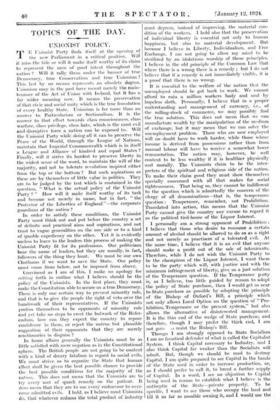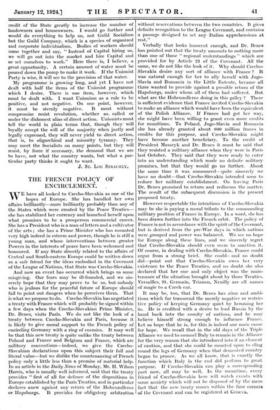TOPICS OF THE DAY.
UNIONIST POLICY.
E Unionist Party finds itself at the opening of the new Parliament in a critical position. Will It miss the tide or will it make itself worthy of its claim to represent the men of good intent throughout the nation ? Will it rally them under the banner of true Democracy, true Conservatism and true Unionism ? This last by no means represents an obsolete dogma. Unionism may in the past have meant merely the main- tenance of the Act of Union with Ireland, but it has a far wider meaning now. It means the preservation of that civic and social unity which is the true foundation of every healthy State. Unionism is far more than an answer to Particularism or Sectionalism. It is the answer to that effort towards class consciousness, class warfare, class privilege, class hate, which is the most evil and disruptive force a nation can be exposed to. Will the Unionist Party while doing all it can to preserve the Peace of the World, through the League of Nations, maintain that Imperial Commonwealth which is in itself a League and Alliance of kindred and equal States ? Finally, will it strive its hardest to preserve liberty in the widest sense of the word, to maintain the will of the majority, and not to tolerate revolution inspired either from the top or the bottom ? But such aspirations as these are by themselves of little value in politics. They are to be judged by the test which is contained in the question, "What is the actual policy of the Unionist Party ? " How will it make itself worthy of its task and become not merely in name, but in fact, "the Protector of the Liberties of England "—the corporate guardians of the nation ?
In order to satisfy these conditions, the Unionist Party must think out and put before the country a set of definite and practical aims and aspirations, and not trust to vague generalities on the one side or to a kind of ignoble expediency on the other. Yet it is evidently useless to leave to the leaders this process of making the Unionist Party fit for its professions. Our politicians bear the name of leaders, but they are usually, in fact, followers of the thing they hunt. We must be our own Chathams if we want to save the State. Our policy must come from below, not be imposed from above.
Convinced as I am of this, I make no apology for setting forth in outline what I believe should be the policy of the Unionists. In the first place, they must make the Constitution able to secure us a true Democracy. There is only one certain way to prevent minority rule, and that is to give the people the right of veto over the handiwork of their representatives. If the Unionists profess themselves to be opponents of minority rule and yet take no steps to erect the bulwark of the Refer- endum, how can they expect the country to repose confidence in them, or reject the untrue but plausible suggestion of their opponents that they are merely reactionaries in disguise ?
In home affairs generally the Unionists must be as little satisfied with mere negation as in the Constitutional sphere. The British people are not going to be content with a kind of dreary fatalism in regard to social evils. We must strive so to organize the State that human effort shall be given the best possible chance to provide the best possible conditions for the majority of the nation. This does not mean that the Unionists arc to try every sort of quack remedy on the patient. It does mean that they are to use every endeavour to over- come admitted evils. I hold, as I believe most Unionists do, that whatever reduces the total product of industry must depress, instead of improving, the material con- dition of the workers. I hold also that the preservation of individual liberty is essential not only to human happiness, but also to material development. But because I believe in Liberty, Individualism, and Free Exchange, I am not going to allow my mind to be sterilized by an idolatrous worship of those principles. I believe in the old principle of the Common Law that where there is a wrong there is a remedy ; but I do not believe that if a remedy is not immediately visible, it is a proof that there is no wrong.
It is essential to the welfare of the nation that the unemployed should be got back to work.- We cannot afford to ruin a million workers body and soul by hopeless sloth. Personally, I believe that in a proper understanding and management of currency, i.e., of the rolling-stock of commerce, we may possibly find the true solution. This does not mean that we can manufacture wealth by the manipulation of the medium of exchange, but it may mean that we can solve the unemployment problem. Those who are now employed will no doubt have to work harder, while those whose income is derived from possessions rather than from manual labour will have to receive a somewhat lower remuneration. The nation may, however, be well content to be less wealthy if it is healthier physically and morally. The Unionists claim to be the inter- preters of the spiritual and religious side of the nation. To make their claim good they must show themselves specially concerned with all that makes for social righteousness. That being so, they cannot be indifferent to the question which is admittedly the concern of the clergy of all denominations—that is, the temperance question : Temperance, remember, not Prohibition. Translated into action, this means that the Unionist Party cannot give the country any excuse to regard it as the political tied-house of the Liquor Interest.
I personally am a strong opponent of Prohibition ; I believe that those who desire to consume a certain amount of alcohol should be allowed to do so as a right and not merely as practisers of a tolerated evil. At the same time, I believe that it is an evil that anyone should make a profit out of the sale of intoxicants. Therefore, while I do not wish the Unionist Party to be the champions of the Liquor Interest, I want them to be the party which will, with j ustice and with the minimum infringement of liberty, give us a just solution of the Temperance question. If the Temperance party is, as I believe, too little guided by reason to adopt the policy of State purchase, then I would get as near to State purchase as possible by adopting the principle of the Bishop of Oxford's Bill, a principle which not only allows Local Option on the question of "Pro- hibition, Temperance or the present system," but also allows the alternative of disinterested management. It is the thin end of the wedge of State purchase, and therefore, though I may prefer the thick end, I am not goin ,o resist the Bishop's Bill.
Thougn I am strongly opposed to State Socialism I am no fanatical defender of what is called the Capitalist System. I think Capital necessary to Industry, and I also think Capital far weaker than the Socialists will admit. But, though we should be mad to destroy Capital, I am quite prepared to see Capital in the hands of the State used in order to increase production, or, as I should prefer to call it, to breed a further supply of Capital. In a word, I sec no objection to Capital being used in reason to establish what I believe is the antiseptic of the State—private property. To be specific, I want to see those who occupy the land and till it as far as possible owning it, and I would use the credit of the State greatly to increase the number of landowners and houseowners. I would go further and would do everything to help on, not Guild Socialism but the Guild Company, which is a species of organized and corporate individualism. Bodies of workers should come together and say, "Instead of Capital hiring us, we will go out into the market and hire Capital and so set ourselves to work." Here there is, I believe, a great opportunity. A certain amount of water must be poured down the pump to make it work. If the Unionist Party is wise, it will see to the provision of that water. My programme is growing long, and yet I have not dealt with half the items of the Unionist programme which I desire. There is one item, however, which must be dealt with. I want Unionism as a rule to be positive, and not negative. On one point, however, it must be sternly negative. It must without compromise resist revolution, whether so. called or under the dishonest alias of direct action. Unionists must tell the world in plain terms that, though they will loyally accept the will of the majority when justly and legally expressed, they will never yield to direct action, that is, to oligarchical and minority tyranny. They may meet the Socialists on many points, but they will resist, by force if necessary, the demand that we are to have, not what the country wants, but what a par- ticular party thinks it ought to want.
J. Si'. LOE STRACHEY.







































 Previous page
Previous page